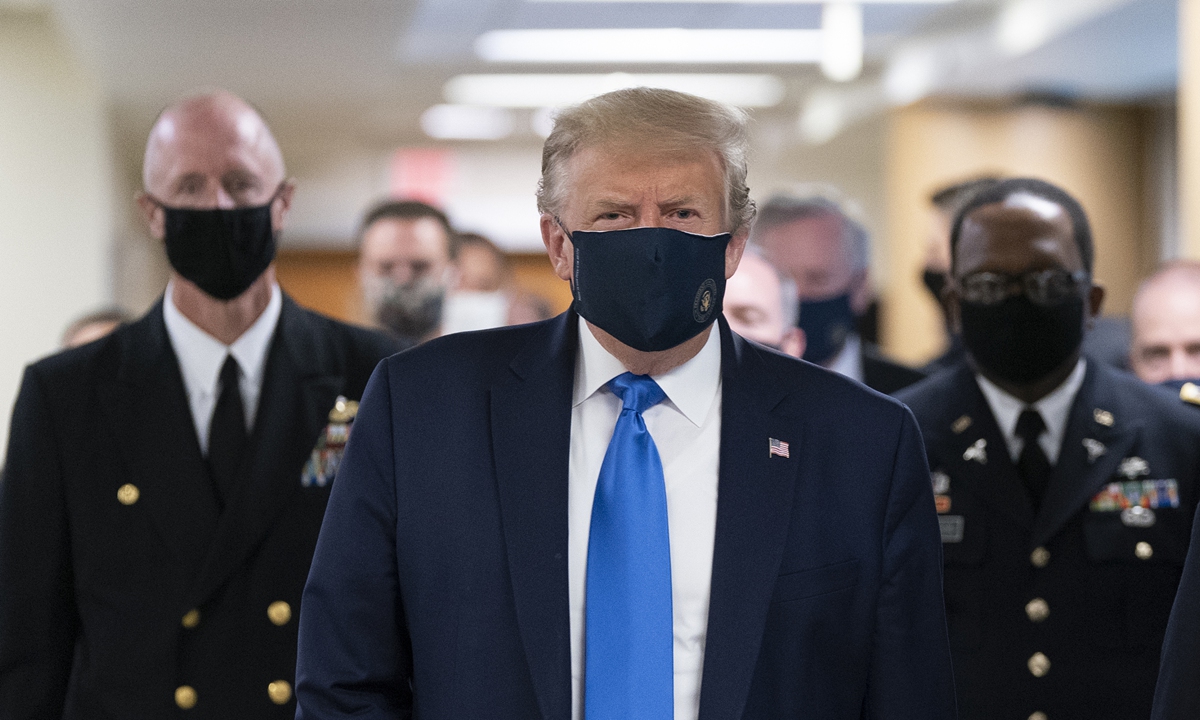The last thing Trump should do is push China as his country falters
By William Jones Source: Global Times Published: 2020/7/26 16:38:53

US President Donald Trump wears a mask as he visits Walter Reed National Military Medical Center in Bethesda, Maryland on Saturday. Photo: VCG
With the enforced closure of the Chinese Consulate General in Houston and US State Secretary Mike Pompeo's declaration at the Richard Nixon Presidential Library in California that engagement with China, as we have known it, is now at an end, it is difficult to see how an era of cooperation between the US and China can be soon reestablished. Obviously President Donald Trump, taking a hit in the polls, feels that taking a tough anti-China stance will help him win the next election, and so he is playing into the China-bashing strategy laid out by his secretary of state.
But there is a general rule that foreign policy issues never play a major role in presidential elections, except during times of war or the threat of war. While there may be some who mistakenly believe that their loss of employment, the growing poverty, and the spread of disease are somehow linked to China, the majority is simply fed up with the way Washington works - or doesn't work. This was the issue that put President Trump in office in the first place - and now it is coming back to bite him.
While much of the civil uproar we are seeing in the streets of the US is fomented by a variety of radical groups, the fact of the growing support for the demonstrations indicates a deep dissatisfaction within the electorate over where things are heading. The increasing spread of the coronavirus in the US can, to a great extent, be attributed to the lackluster performance of Trump, who only now with the resurgence of the virus finally donned a mask and encourages people to wear one in order to stem the spread of the disease. The early failure to rigorously invoke the Defense Production Act in order to mandate production of the needed protective gear is still felt in the lack of equipment and facilities to deal with the resurgence in places like Texas and Florida.
And the revival of the US economy, which President Trump so proudly announced as the major task of his presidency, has not even gotten to the drawing board. While the resurgence of COVID-19 has hamstrung the hoped-for reopening of the economy, his much-touted infrastructure program has gone nowhere from Day 1, in spite of the fact that it would have garnered that much sought-after support from Democrats in the House. And it's not clear that his new "law-and-order" platform, characterized by his deployment of federal troops in some of US major cities to quell the lawlessness, will play well to an electorate - many of whom may well sympathize with some of the concerns of the demonstrators.
In such a situation, creating a conflict with China is the last thing President Trump should do. While the polls may be accurate that he is trailing Joe Biden in the elections, it's hard to see that "China-bashing" will turn the tide in his favor. The most important issue for a US president at this point in time is to lead the nation out of crisis.
First, it requires taking leadership in beating the rampant virus. If this means a delay in the total reopening of the economy or a late start for the schools, so be it. More American lives will be saved, and that is a plus for the president. Donning a mask is a step in the right direction.
Second, he can begin laying plans for a post-epidemic recovery, and this would have to include a major infrastructure program to repair the nation's dilapidated transportation grid - railroads, bridges, and highways. Work on these can even safely begin before there is a full reopening of the economy.
Third, he can use the planned space program to begin to mobilize the forces of science and technology to help rebuild our technological capabilities.
If we are indeed in a "strategic competition" with China, the only rational policy is to try to rebuild the US - and not try to tear down China. Because in spite of all the ink that has been spilt on this issue, China did not become an economic power by stealing American technology. They did it through the blood, sweat and tears of their billion plus population - and did this quite effectively under the leadership of the Communist Party of China.
The author is the Washington Bureau Chief of Executive Intelligence Review and a non-resident fellow of the Chongyang Institute for Financial Studies. opinion@globaltimes.com.cn
Posted in: VIEWPOINT